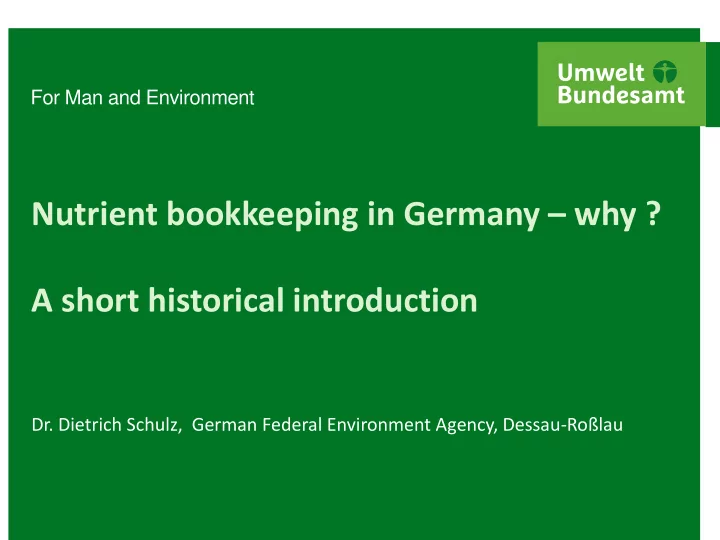

For Man and Environment Nutrient bookkeeping in Germany – why ? A short historical introduction Dr. Dietrich Schulz, German Federal Environment Agency, Dessau-Roßlau
The North Sea – too much nutrients 1. The Wadden Sea in the 80ies – A World Nature Heritage Site under pressure: • Epidemic viruses among seals (weak immune system) • Black spots (sulfides) • Lack of oxygen due to nutrient inputs 2. 3rd International North Sea Conference 1990 • Reduce nutrient input by 50% 3. Reduce national nutrient surplus by 50% (especially nitrogen, minimum factor in marine ecosystems) 11.04.2014 Dr. Dietrich Schulz, FEA Germany; HELCOM AEF Tallinn 2
National nitrogen farmgate balance 11.04.2014 Dr. Dietrich Schulz, FEA Germany; HELCOM AEF Tallinn 3
National nitrogen balance in Germany 11.04.2014 Dr. Dietrich Schulz, FEA Germany; HELCOM AEF Tallinn 4
Nutrient balances: Regional aspects 11.04.2014 Dr. Dietrich Schulz, FEA Germany; HELCOM AEF Tallinn 5
The Nitrates Directive – drinking water and good agricultural practice • The nitrates directive was issued in 1991 to safeguard groundwater quality and help to implement the drinking water limit value of 50 mg nitrate/l. Quality standard for baby food 10 mg nitrate/l. • Identify nitrate vulnerable zones, elaborate codes of good agricultural practice • Whole Germany is vulnerable zone. Good agricultural practice in fertilizer application compulsory 1996 (DüV; amendment in 2007; next amendment in 2014). • Methods to predict N-fertilizer needs (1975 ff). Nmin, EUF. Nutrient bookkeeping to validate (and improve) models ex post (research and development). Broader application in winter wheat (advisory services). 11.04.2014 Dr. Dietrich Schulz, FEA Germany; HELCOM AEF Tallinn 6
The Phosphate problem – resource efficiency versus intensive livestock farming • Efficient plant growing: Apply manure (as fertilizer) according to the plants need • Efficient livestock farming: Get rid of manure (as waste) as cheap as possible. • Soils with high P-contents (D and E). • Waste of valuable P-resources in agriculture - Expensive research programmes to regain P from municipal waste water. 11.04.2014 Dr. Dietrich Schulz, FEA Germany; HELCOM AEF Tallinn 7
Nitrogen and Phosphorus – a partially legalized waste Regulation versus bookkeeping: Phosphate Ordinance on fertilizer application (DüV): - Phosphate surplus up to 20 kg/ha allowed (generally). - Oncoming amendment: on soils with high and very high P-status (Classes D and E) only surplus 0 allowed. Nitrogen - 60 kg N/ha allowed as surface balance. Ammonia emissions (losses) included would give about 80-90 kg/ha (legal upper limit!). - Actual national balance (average!!): N-surplus about 100 kg/ha. 11.04.2014 Dr. Dietrich Schulz, FEA Germany; HELCOM AEF Tallinn 8
Nutrient Bookkeeping: A Prerequisite for Farm Management Systems and (voluntary) Sustainability Certification • Voluntary farm sustainability assessment systems in Germany (KSNL; REPRO/DLG) use a set of indicators (economic, ecologic and social) to assess the sustainability performance of farms. • As regards nutrients: - 0 - 50 kg N/ha surface balance - 0 - 30 kg Ammonia-N/ha - 0 +/-15 kg Phosphate/ha • Farms can use sustainability certificates in communication, public relation etc., but normally do not get higher prices for their products. Some Federal States demand a certificate as basic need for participation in second pillar programmes. 11.04.2014 Dr. Dietrich Schulz, FEA Germany; HELCOM AEF Tallinn 9
Regional aspects: e. g. Lower Saxony • Nutrient bookkeeping on farm level (according to federal law, DüV). • Nutrient bookkeeping on farm level about import/export of manure (and other organic fertilizers; Verbringungsverordnung; Meldeverordnung). Controlled by the Chamber of Agriculture (special software). • Data are used for Nitrate and P-Reports compiled on county level. 11.04.2014 Dr. Dietrich Schulz, FEA Germany; HELCOM AEF Tallinn 10
County OUTPUT INPUT other organic export of manure imports and others application of Limit manure imports other organic value fertilizers 170 kg N/ha manure excretion Biogas manure production by animals within application within county county corn import 11.04.2014 Dr. Dietrich Schulz, FEA Germany; HELCOM AEF Tallinn 11
Nutrient hot spots (in NW-Germany): N-Application via organic fertilizers (manure and fermentation leftovers) • In 2 counties the Nitrates Directive (170 kg N/ha) is exceeded (not only by single farms, but by the whole counties). • Other counties are close to the limit. 11.04.2014 Dr. Dietrich Schulz, FEA Germany; HELCOM AEF Tallinn 12
Nutrient hot spots II: P-surplus in NW-Germany • In pig and poultry areas (contrary to dairy cattle) P is the most important nutrient to trigger nutrient exports. • The current amendment of fertilizer regulations (DüV) will increase this trend, because on soils with high P-status the P- balance must be lowered to zero. 11.04.2014 Dr. Dietrich Schulz, FEA Germany; HELCOM AEF Tallinn 13
Summary - Nutrient bookkeeping was developed for agronomical, health and environmental reasons. It is a tool for efficient fertilizer use, safeguarding drinking water quality and good environmental status. - Nutrient bookkeeping can be applied on farm level, regional or whole memberstate level. It can be adapted for diferent targets. - Nutrient bookkeeping as part of good agricultural practice provides data (instead of speculations) for environmental discussions, agricultural communication (PR), quality schemes and legal requirements. It is also a valuable tool to concentrate environmental programmes and measures on the areas where they are most urgently needed. 11.04.2014 Dr. Dietrich Schulz, FEA Germany; HELCOM AEF Tallinn 14
Thank you for your attention Dietrich Schulz Dietrich.schulz@uba.de + 49 340 2103 2885 www.uba.de 11.04.2014 / Hier steht der Veranstaltungstitel in 12 Punkt 15
Recommend
More recommend